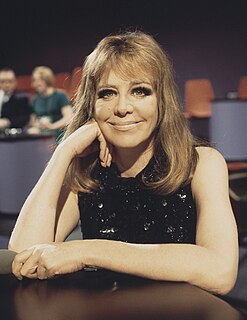
Hildegard Frieda Albertine Knef was a German actress, voice actress, singer, and writer. She was billed in some English-language films as Hildegard Neff or Hildegarde Neff.
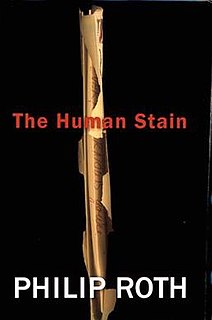
The Human Stain is a novel by Philip Roth, published May 5, 2000. The book is set in Western Massachusetts in the late 1990s. It is narrated by 65-year-old author Nathan Zuckerman, who appears in several earlier Roth novels, and who also figures in both American Pastoral (1997) and I Married a Communist (1998), two books that form a loose trilogy with The Human Stain. Zuckerman acts largely as an observer as the complex story of the protagonist, Coleman Silk, a retired professor of classics, is slowly revealed.
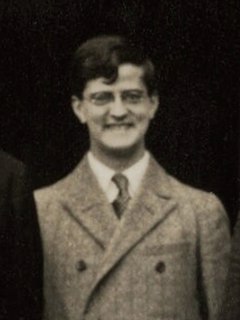
Alfred Leslie Rowse was a British historian and writer, best known for his work on Elizabethan England.

William Shakespeare (1564–1616) wrote sonnets on a variety of themes. When discussing or referring to Shakespeare's sonnets, it is almost always a reference to the 154 sonnets that were first published all together in a quarto in 1609. However, there are six additional sonnets that Shakespeare wrote and included in the plays Romeo and Juliet, Henry V and Love's Labour's Lost. There is also a partial sonnet found in the play Edward III.

John Thomas Looney (luni) was an English school teacher who is notable for having originated the Oxfordian theory, which claims that Edward de Vere, 17th Earl of Oxford (1550–1604) was the true author of Shakespeare's plays.
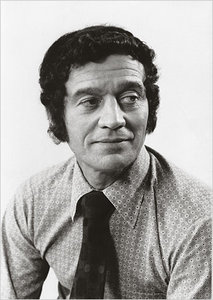
Anatole Paul Broyard was an American writer, literary critic, and editor who wrote for The New York Times. In addition to his many reviews and columns, he published short stories, essays, and two books during his lifetime. His autobiographical works, Intoxicated by My Illness (1992) and Kafka Was the Rage: A Greenwich Village Memoir (1993), were published after his death.

Emilia Lanier, néeAemilia Bassano, was an English poet and the first woman to assert herself as a professional poet, through her volume Salve Deus Rex Judaeorum. Attempts have been made to equate her with Shakespeare's "Dark Lady".
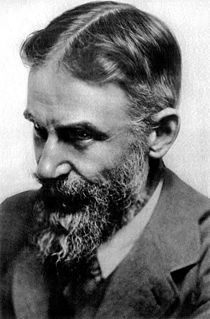
Candida, a comedy by playwright George Bernard Shaw, was written in 1894 and first published in 1898, as part of his Plays Pleasant. The central characters are clergyman James Morell, his wife Candida and a youthful poet, Eugene Marchbanks, who tries to win Candida's affections. The play questions Victorian notions of love and marriage, asking what a woman really desires from her husband. The cleric is a Christian Socialist, allowing Shaw—himself a Fabian Socialist—to weave political issues, current at the time, into the story.
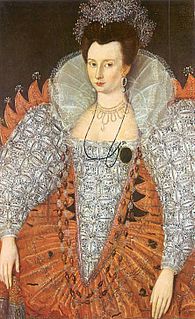
Mary Fitton was an Elizabethan gentlewoman who became a maid of honour to Queen Elizabeth. She is noted for her scandalous affairs with William Herbert, 3rd Earl of Pembroke, Vice-Admiral Sir Richard Leveson, and others. She is considered by some to be the "Dark Lady" of Shakespeare's sonnets.

Elizabethan literature refers to bodies of work produced during the reign of Queen Elizabeth I (1558–1603), and is one of the most splendid ages of English literature. In addition to drama and the theatre, it saw a flowering of poetry, with new forms like the sonnet, the Spenserian stanza, and dramatic blank verse, as well as prose, including historical chronicles, pamphlets, and the first English novels. Major writers include William Shakespeare, Edmund Spenser, Christopher Marlowe, Richard Hooker, Ben Jonson, Philip Sidney and Thomas Kyd.
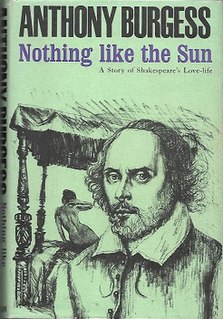
Nothing Like the Sun is a fictional biography of William Shakespeare by Anthony Burgess first published in 1964. It tells the story of Shakespeare's life with a mixture of fact and fiction, the latter including an affair with a black prostitute named Fatimah, who inspires the Dark Lady of the Sonnets. The title refers to the first line of Sonnet 130, "My mistress' eyes are nothing like the sun", in which Shakespeare describes his love for a dark-haired woman.

The Haj is a novel published in 1984 by American author Leon Uris that tells the story of the birth of Israel from the viewpoint of a Palestinian Arab.

Inside Mr Enderby is the first volume of the Enderby series, a quartet of comic novels by the British author Anthony Burgess.

The Clockwork Testament is a novella by the British author Anthony Burgess. It is the third of Burgess' four Enderby novels and was first published in 1974 by Hart-Davis, MacGibbon Publishers. It is usually subtitled Enderby's End, as it was originally intended to be the last book in the Enderby series. However, a further sequel, Enderby's Dark Lady, followed in 1984.

If Beale Street Could Talk is a 1974 novel by American writer James Baldwin. His fifth novel, is a love story set in Harlem in the early 1970s. The title is a reference to the 1916 W.C. Handy blues song "Beale Street Blues", named after Beale Street in Downtown Memphis, Tennessee.

Sonnet 57 is one of 154 sonnets written by the English playwright and poet William Shakespeare. It is a member of the Fair Youth sequence, in which the poet expresses his love towards a young man. Sonnet 57 is connected with Sonnet 58 which pursues the theme of the poet as a slave of the beloved.

The End of the World News is a 1982 novel by British author Anthony Burgess.

Sonnet 144 was published in the Passionate Pilgrim (1599). Shortly before this, Francis Meres referred to Shakespeare's Sonnets in his handbook of Elizabethan poetry, Palladis Tamia, or Wit's Treasurie, published in 1598, which was frequently talked about in the literary centers of London taverns. Shakespeare's sonnets are mostly addressed to a young man, but the chief subject of Sonnet 127 through Sonnet 152 is the "dark lady". Several sonnets portray a conflicted relationship between the speaker, the "dark lady" and the young man. Sonnet 144 is one of the most prominent sonnets to address this conflict.
This is a list of works by the English writer Anthony Burgess.
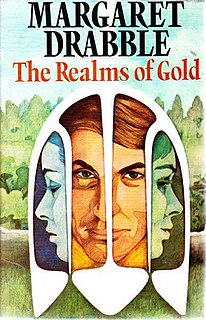
The Realms of Gold is a 1975 novel by British novelist Margaret Drabble. The novel explores the mid-life experiences of anthropologist Frances Wingate and her affair with Karel Schmidt.



















